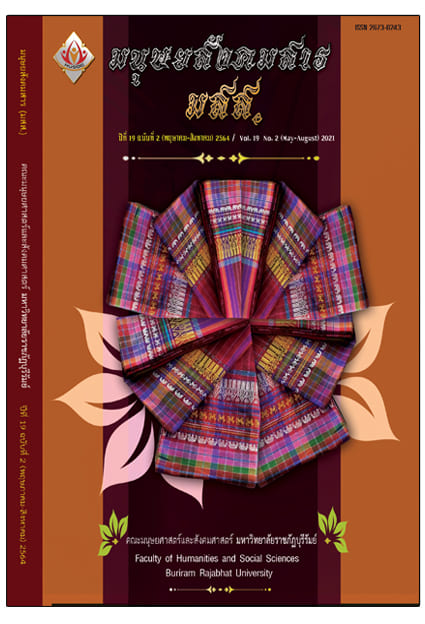Difference in Ethnic and Local Wisdom under Forest Resources Conservation
Main Article Content
Abstract
The objectives of this study were to exploer: 1) geosocial context and environmental; 2) local wisdom in forest resource conservation of an ethnic group in different geosocial conditions; and 3) problems encountered and guidelines for solving the problems. The sample group consisted of local people in Bann Pong community (local land area), Sansai District, Chiang Mai Province and highland Karen ethnic group in Mae Tom watershed area, Om-koi Sub district, Om-koi district, Chiang Mai Province. They obtained by a purposive sampling method consisted of community leaders, local scholars and villagers. In-depth interview and observation form were used in data collection and analyzed by using content analysis. The study results revealed that there was the difference in geosocial context and culture between the two groups in this study but no difference in benefit gaining from forest resources. The Karen ethnic group in this study did not seriously practice about their traditional related to supernatural beliefs like in the past due to economic change and they preferred to do monoculture. Meanwhile, the people in Baan Pong community put the importance on social adherence and forest conservation by local wisdom based on community participation. Regarding local wisdom conservation transfer, it was still be a problem since young people moved to big cities for job and educational opportunities. However, the two communities have been finding ways for the rehabilitation of local wisdom transfer and forest resource conservation under participatory management.
Article Details

This work is licensed under a Creative Commons Attribution-NonCommercial 4.0 International License.
เนื้อหาและข้อมูลในบทความที่ลงตีพิมพ์ในวารสารทดสอบระบบ ThaiJo2 ถือเป็นข้อคิดเห็นและความรับผิดชอบของผู้เขียนบทความโดยตรงซึ่งกองบรรณาธิการวารสาร ไม่จำเป็นต้องเห็นด้วย หรือร่วมรับผิดชอบใดๆ
บทความ ข้อมูล เนื้อหา รูปภาพ ฯลฯ ที่ได้รับการตีพิมพ์ในวารสารทดสอบระบบ ThaiJo2 ถือเป็นลิขสิทธิ์ของวารสารทดสอบระบบ ThaiJo2 หากบุคคลหรือหน่วยงานใดต้องการนำทั้งหมดหรือส่วนหนึ่งส่วนใดไปเผยแพร่ต่อหรือเพื่อกระทำการใดๆ จะต้องได้รับอนุญาตเป็นลายลักอักษรจากวารสารทดสอบระบบ ThaiJo2 ก่อนเท่านั้น
References
Chumnan, T., et al. (2017). The changing of economics that effected to social status of community in Chiang Rai province. Rajabhat Chiang Mai Research Journal, 19(1), pp. 105-111. [in Thai]
Chumpa, N., et al. (2019). Cultural resources knowledge management and development guidelines of Khamu ethnic group in Huay-lan village, Wiang Kaen district, Chiang Rai province. Journal of Community Development and Life Quality, 7(1), pp. 12-23. [in Thai]
Interatep, S., et al. (2017). State of problems and development of local herbs consumption wisdom transfer for
green living in the community, Srakaew province. Journal of Humanities and Social Sciences Valaya alongkorn, 12(2), pp. 275-285. [in Thai]
Keyes, Charles F. (1989). Buddhist politics and their revolutionary origins in Thailand. International Political Science Review, 10(2), pp. 121-142.
Nunart, N. (2017). Local wisdom as the value of life and culture for sustainable education. Social Sciences Research and Academic Journal, 12(34), pp. 17-26. [in Thai]
Royal Forest Department. (2020). Forestry statistics data 2018. Retrieved on 20 April 2020 from http://forestinfo.forest.go.th/Content/file/stat2561 [in Thai]
Puthong, D. (2018). The community forest management for sustainability using process of public participation and local tradition in northern Thailand region. Journal of Admisnistrative and Management, 6(2), pp. 80-94. [in Thai]
Sirasoontorn, P. (2004). Social development concept and theory. Phitsanulok; Naresuan University. [in Thai]
Santasombat, Y. (2004). Ecology ethnic biology resources and community rights. Chiang Mai: Withindesign. [in Thai]
Tiacharoen, S., et al. (2017). The model of knowledge management for local wisdom in school toward creative economic development and sustainable community. Veridian E-Journal Silpakorn University Humanities, Social
Sciences, and Arts, 10(3), pp. 1371-1392. [in Thai]
Wongwatthanaphong, K. (2016). Impacts of commercial agricultural production system on Hmong ethnic groups. Journal of Southern Technology, 9(1), pp. 69-74. [in Thai]


